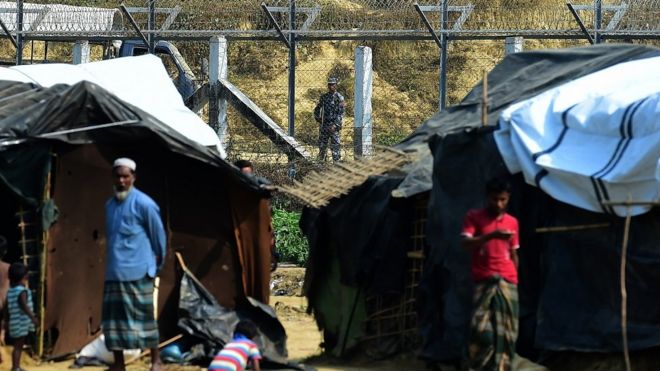Rohingya crisis: UN envoy says refugees facing 'forced starvation'

Myanmar has not halted its ethnic purging of the Rohingya individuals in Rakhine express, a Unified Countries human rights official said on Tuesday.
The UN agent's evaluation of a proceeded with "crusade of fear and constrained starvation" comes a half year after a military crackdown caused a mass departure of Rohingya Muslims.
Somewhere in the range of 700,000 individuals have fled to neighboring Bangladesh since August.
They have since recounted murder, assault and pyro-crime by troopers and vigilantes.
Myanmar's military says it is battling Rohingya aggressors and denies focusing on regular folks in Rakhine state.
"inconceivable" for any Rohingya to return to Rakhine state in the near future in a safe " said the UN's assistant secretary-general for human rights, Andrew Gilmour..
"The nature of the violence has changed from the frenzied blood-letting and mass rape of last year to a lower intensity campaign of terror and forced starvation," he included, alluding to a locale in southern Bangladesh which is home to the majority of the evacuees.
"The government of Myanmar is busy telling the world that it is ready to receive Rohingya returnees, while at the same time its forces are continuing to drive them into Bangladesh," Mr Gilmour said.
Bangladesh and Myanmar specialists had been in talks over repatriating displaced people in the coming months yet a development of Myanmar military on the outskirt a week ago started concern.
The UN emissary said it was "unfathomable" for any Rohingya to come back to Rakhine state sooner rather than later in a "sheltered, honorable and supportable" way.
"The legislature of Myanmar is occupied with telling the world that it is prepared to get Rohingya returnees, while in the meantime its powers are proceeding to drive them into Bangladesh," Mr Gilmour said.
Wellbeing in the sewage
By Anbarasan Ethirajan, Balukhali evacuee camp, close to Cox's Bazar
In the months since they arrived, the majority of the 700,000 Rohingya displaced people now seem, by all accounts, to be in camps with a rooftop over their heads and nourishment gave by help offices. They are never again living on roadsides or in the wilderness.
In any case, a stroll through Balukhali, one of the biggest outcast camps on the planet, is an amazing and serious experience.
In excess of 300,000 men, ladies and youngsters are confined in shacks made of bamboo and plastic sheeting.
There are rivulets of sewage going through the camps. The vast majority of the shacks are sitting unstably on slope porches.
I could see many men, ladies and even kids conveying their week after week sustenance proportions. The evacuees may feel more secure, however the genuine test will begin once the storm starts in a few months.
Comments
Post a Comment